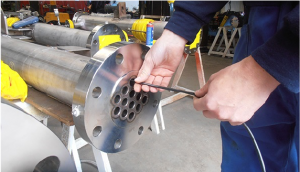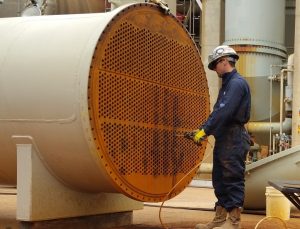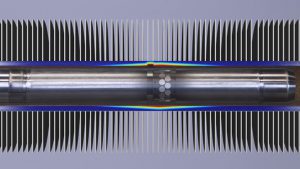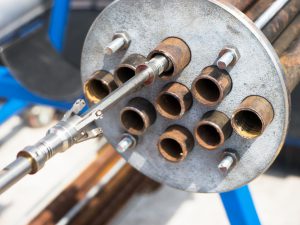Heat Transfer equipment such as heat exchangers, air fin coolers, boilers, and condensers require NDE examinations. TechCorr offers highly trained personnel certified in accordance with the American Society of Nondestructive Testing requirements. TechCorr goes further in the certification requirements for a competent analyst by requiring individuals to pass extensive mockup test bundles that are established in the industry for qualifying personnel prior to performing work at specific plants.
Exchanger Inspection
- Home
- Exchanger Inspection
Exchanger Inspection

Eddy Current (EC) testing is very sensitive to a great number of variables such as cracks, corrosion, fretting, erosion, material thickness, coating thickness, material changes; making it a powerful examination tool. Eddy Current can be as accurate as +/- 5% sensitivity (or more if using array probes) but limited to nonferromagnetic and slightly magnetic alloys. The Eddy Current Technique is based on the induction of an electromagnetic field in the component being examined which when measured for distortion can detect various forms of internal and external tube damage.

Remote Field (RF) testing is an electromagnetic examination which utilizes the through transmission effect to produce a resultant field that is affected by anomalies and is measured a few tube diameters away from the AC excitation source, without any tube magnetization or saturation. RFT is used primarily for the inspection of ferromagnetic tubing. This inspection consists of a full-length examination performed from the inside diameter with equal inner and outer surface discontinuity detection and sizing. The objective of this technique is to detect ID and OD degradation such as corrosion, erosion, pitting, fretting and gradual wall loss generally found in ferromagnetic tubing.

Near Field (NF) examination is similar to the externally referenced method however uses a near field transmitter and receiver coil inducing eddy currents axially, radially and circumferentially, in the tube wall. NFT operates in the same frequency as remote field technology as such is only suited for ferromagnetic materials. NFT is highly sensitive to defects close to structures such as supports, tube sheets and similar.

Internal Rotary Inspection service (IRIS) is an ultrasonic method sensitive to both ID and OD forms of volumetric wall loss. Measurements as accurate as +/- .005 Inches can be obtained. However, IRIS accuracy and sensitivity are compromised when in used with the presence of ID or OD deposits, bends, geometry changes. Tube cleanliness is critical for this method. IRIS is not sensitive to non-volumetric forms of degradation such as cracking.
